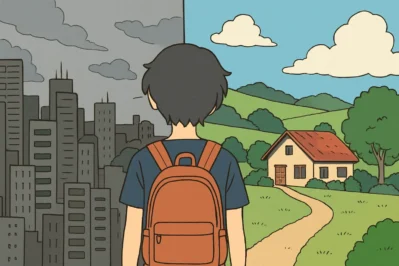Hello! Welcome to Daily Hangul, the place to be to upgrade your Korean skills!
Have you ever dreamed of swapping the concrete jungle for green fields? Today, we’re diving into a fascinating topic: the growing trend of leaving city life behind for the Korean countryside. We’ll learn how to interview someone about their reasons for making this big move, using expressions that will make you sound thoughtful and fluent.
Lately in Korea, there’s a huge wave of people, especially in their 20s and 30s, moving out of bustling cities like Seoul. This is called 귀농 (gwinong) or 귀촌 (gwichon). You might have seen this lifestyle glorified in popular K-dramas or reality shows. It’s a hot topic, and knowing how to talk about it will definitely level up your conversation skills!
Let’s get started!
Key Expressions for Your Interview
Here are some essential phrases to discuss the motivations behind leaving the city.
1. -(으)ㄹ 결심을 하다 (to make up one’s mind to…)
- Pronunciation: [-(eu)l gyeol-sim-eul ha-da]
- English Meaning: To resolve to do something; to make the firm decision to…
- Detailed Explanation: This pattern is much stronger than simply saying “I decided to.” It implies that you’ve thought long and hard about a significant, often difficult, choice. It carries a sense of determination and resolution. You use -을 결심을 하다 after a verb stem ending in a vowel (e.g., 떠나다 -> 떠날 결심을 하다) and -을 결심을 하다 after a verb stem ending in a consonant (e.g., 옮다 -> 옮을 결심을 하다).
2. 삭막하다 (to be bleak/dreary)
- Pronunciation: [sak-mak-ha-da]
- English Meaning: Bleak, dreary, desolate, impersonal.
- Detailed Explanation: This is a wonderfully descriptive adjective used for places or atmospheres that feel cold and lack human warmth or nature. It’s the perfect word to describe the feeling of being surrounded by endless grey buildings or being in a hyper-competitive, impersonal environment. It powerfully captures a key reason why people crave the countryside.
3. 여유를 찾다 (to find peace/breathing room)
- Pronunciation: [yeo-yu-reul chat-da]
- English Meaning: To find peace of mind; to find some leisure or breathing room.
- Detailed Explanation: 여유 (yeoyu) is a crucial concept in Korean culture. It’s more than just “free time”; it’s a state of having mental, emotional, and temporal space. It’s the opposite of being rushed and stressed. 여유를 찾다 means to actively seek and regain this peaceful state of being.
4. 도시 생활에 염증을 느끼다 (to be sick and tired of city life)
- Pronunciation: [do-si saeng-hwal-e yeom-jeung-eul neu-kki-da]
- English Meaning: To feel sick and tired of city life.
- Detailed Explanation: This is a fantastic idiom! 염증 (yeomjeung) literally means “inflammation” in a medical sense. So, this expression paints a picture of city life as an irritant that you’ve developed an almost allergic, painful reaction to. It’s a very strong and expressive way to say you’re completely fed up.
Example Dialogue
Let’s see how these expressions work in a natural conversation. Here, Person A is interviewing Person B, who recently moved to the countryside.
A: 우와, 여기 공기가 정말 맑네요. 어떤 계기로 귀농을 결심하게 되셨어요?
(Wa, yeogi gong-gi-ga jeong-mal mal-neyo. Eotteon gyegi-ro gwinong-eul gyeolsim-hage doesyeosseoyo?)
(Wow, the air here is so fresh. What made you decide to move and start farming?)
B: 서울의 경쟁적이고 삭막한 분위기에 염증을 느꼈거든요. 저만의 시간을 가지면서 마음의 여유를 찾고 싶었어요.
(Seoul-ui gyeongjaeng-jeog-igo sakmakan bunwi-gi-e yeomjeung-eul neukkyeot-geodeun-yo. Jeo-man-ui sigan-eul gaji-myeonseo ma-eum-ui yeoyu-reul chat-go sip-eosseoyo.)
(I grew sick and tired of the competitive and bleak atmosphere of Seoul. I wanted to have my own time and find some peace of mind.)
A: 그렇군요. TV 프로그램 ‘어쩌다 사장’을 보면 시골의 삶이 매력적으로 보이더라고요.
(Geureokun-yo. TV peurogeuraem ‘Eojjeoda Sajang’-eul bomyeon sigol-ui salm-i maeryeok-jeog-euro boi-deorago-yo.)
(I see. Watching the TV show ‘Unexpected Business’, country life looks so charming.)
B: 맞아요. 물론 힘든 점도 있지만, 지금은 훨씬 만족스러워요.
(Majayo. Mullon himdeun jeom-do it-jiman, jigeum-eun hwolssin manjok-seureowo-yo.)
(That’s right. Of course, there are hard parts, but I’m much more satisfied now.)
Culture Tip & Trend Deep Dive
You might hear two related terms: 귀농 (Gwinong) and 귀촌 (Gwichon). What’s the difference?
* 귀농 (Gwinong): This specifically means “returning to farming.” It implies that agriculture will be your main source of income.
* 귀촌 (Gwichon): This means “returning to a rural village.” This is a broader term. You might work remotely, open a small cafe, or simply enjoy the rural lifestyle without farming.
This trend isn’t just a fantasy; it’s a real social phenomenon in Korea, accelerated by the pandemic and the desire for a better work-life balance. As mentioned in the dialogue, TV shows like ‘Unexpected Business’ (어쩌다 사장) or ‘Three Meals a Day’ (삼시세끼) have played a huge role. They portray a slower, more community-oriented life that stands in stark contrast to the ‘빨리빨리’ (ppalli-ppalli / hurry-hurry) culture of big cities.
If you’re on Instagram, search for hashtags like #시골살이 (sigol-sari / country life) or #귀촌라이프 (gwichon-life). You’ll see thousands of aesthetic posts from young Koreans documenting their new lives—from harvesting their first tomatoes to renovating old countryside homes. It’s a whole vibe!
Let’s Practice!
Time to put your knowledge to the test!
- Fill in the Blank:
매일 반복되는 일상에 지쳐서, 새로운 도전을 하기로 ________.
(maeil banbok-doeneun ilsang-e jichyeoseo, saeroun dojeon-eul hagi-ro ______.)
(Tired of the repetitive daily routine, I ________ to take on a new challenge.) -
Make a Sentence:
Imagine you’re having a stressful week. Using the expression 여유를 찾다, write one sentence in Korean about what you want to do this weekend.
Great job today! You’ve learned not just some useful Korean expressions, but also about a major cultural trend in Korea.
Now it’s your turn! Have you ever dreamed of leaving the city? Leave a comment below using one of the phrases we learned today! We’d love to read your thoughts.






